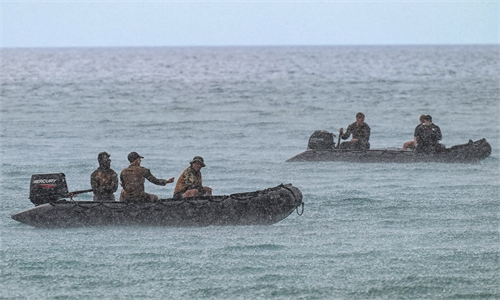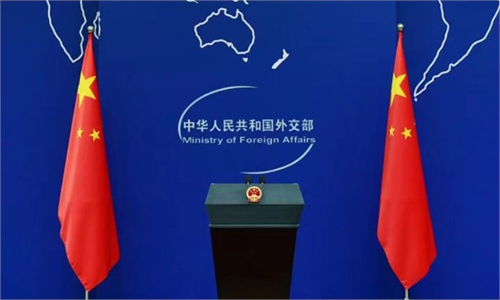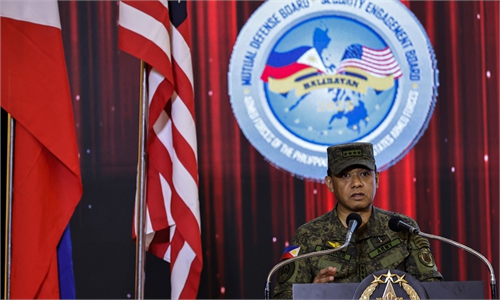
Illustration: Chen Xia/GT
The annual Balikatan military exercises between the US and the Philippines kicked off on Monday, with around 17,000 troops expected to take part. Philippine Brigadier General Michael Logico, director for the drills, recently claimed that the Balikatan, which means "shoulder to shoulder" in the Philippine language Tagalog, is "the Super Bowl of all exercises in this part of the region." However, Manila has seriously misjudged the event.
At the same time, the US and the Philippines are trying to weave a narrative that portrays the Balikatan as "a rehearsal for our [US-Philippines] defense;" however, what is really written in the script is Washington's obsession with "containing China," reinforcing an "us versus China" mind-set both in the region and beyond.
In fact, far from being a "Super Bowl," the drills are more like a "super troll" - in the online world, a "troll" is someone who deliberately provokes or enrages others, usually for attention. Despite Logico's insistence that Washington and Manila are "agnostic" to how Beijing might react, many aspects of Balikatan overflow with provocation toward China.
For instance, for this year's drills, the US reportedly would deploy its Navy-Marine Expeditionary Ship Interdiction System, also known as the NMESIS to the Luzon Strait, "a choke point for Chinese naval access to the Pacific Ocean," according to Newsweek.
Besides, the US Marine Corps confirmed last week that the NMESIS missile system would remain in the Philippines for future exercises if it was "appropriate and requested" by Manila. This triggered an association with the Typhon mid-range missile system, which was deployed by the US in the Philippines in the Balikatan 2024 and has since remained in the country. Should these systems remain on Philippine soil, they will become a constant source of tension in the region.
Apart from its military function, the US-Philippines military exercises also serve as a platform for Washington to strengthen its relationship with Manila. US Defense Secretary Pete Hegseth claimed during a visit to the Philippines last month that Washington was determined to "re-establish deterrence, and come alongside our allies and partners first and foremost in this region." However, this is more of a carefully staged political mirage than a rock-solid guarantee.
As Chinese military affairs expert Song Zhongping pointed out in an interview with the Global Times, the Philippines has long fancied itself main protagonists in these US-led drills. In reality, Balikatan is the US' muscle-flexing showcase, using the Philippines' strategic location as its backdrop.
Song adds that the US' attempt to enhance its military presence in the Philippines is not only about maintaining regional hegemony but also about realizing its three expectations from Manila - to buy US weapons, provide bases for US troops and stage China-targeted drills. The Philippines should not overestimate its own role or fall into a miscalculation that could eventually sacrifice its own interests.
Balikatan might grab some headlines, and it may give Manila a fleeting sense of "security." Yet in the long run, being led by the nose into a high-stakes great power game could leave the Philippines tossed around like a rugby ball by the very ally it wants to impress.



